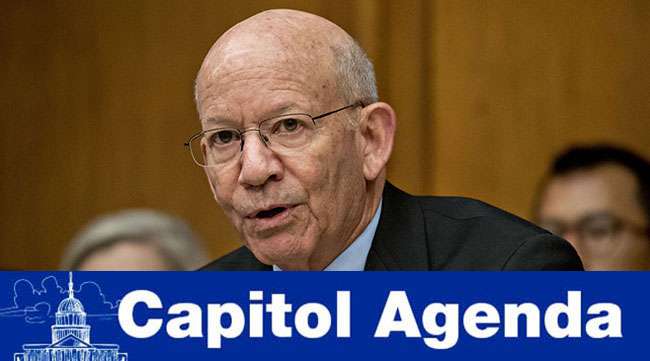Senior Reporter
US House Transportation Panel Delves Into COVID-19 Concerns

[Stay on top of transportation news: Get TTNews in your inbox.]
The new year means a new session of Congress and the opportunity to achieve reforms across the federal landscape.
To do so, lawmakers point to the need to push ahead on a resolution to the coronavirus pandemic. This week, the House Transportation and Infrastructure Committee scheduled a hearing to assess the pandemic’s impact on the country’s mobility networks, and potential solutions to ongoing problems.
Rep. Peter DeFazio (D-Ore.), the panel’s chairman, explained he intends to examine gaps in safety practices pertaining to passengers and the transportation workforce during the national health crisis.

Mulero
“As our nation mourns the loss of more than 430,000 Americans to COVID-19, transportation workers around the country continue to show up for work to drive buses and trains, ensure the safety of passengers on airplanes, move freight by truck, ship, rail and air, and repair roads and bridges — all to keep our communities and economy moving,” DeFazio said in a statement to Transport Topics. “That includes truck drivers, who are vital to keeping grocery stores stocked with supplies and transporting personal protective equipment, or PPE, and other medical equipment, including life-saving vaccines, throughout the country during the pandemic.”
American Trucking Associations recently called on the Centers for Disease Control and Prevention’s Advisory Committee on Immunization Practices to classify truck drivers as “frontline essential workers.” The CDC’s group classification for “frontline essential workers” is “Phase 1b.” Workers in transportation and logistics are classified as “Phase 1c.” The classifications are used to determine priority for the phased implementation of the COVID-19 vaccine.

Sustainable trucking is here. In this episode, we'll talk to two major players in the transportation technology sector that are helping fleets move closer to total supply chain sustainability. Hear a snippet, above, and get the full program by going to RoadSigns.TTNews.com.
“Including America’s professional truck drivers in Phase 1b will help ensure the supply chain keeps running, essential frontline workers have the resources they need and high-risk populations have continued access to the vaccine,” ATA indicated in a letter to the CDC’s advisory committee Jan. 27.
Key aspects of the transportation system are enduring challenges that necessitate government action. First, policymakers agree on the urgency to mitigate the spread of the virus, enhance the reach of vaccination campaigns and reinforce the ability for states and municipalities to test residents.
President Joe Biden is seeking to expand the country’s response efforts via a $1.9 trillion emergency aid proposal. Congressional leaders, as expected, applaud calls for getting things done on Capitol Hill, if it means a scaled-down version of a COVID-19 aid package, or an infrastructure policy bill. Ameliorating freight and transit connectivity remains a priority for congressional leaders, as well as the Biden administration.
The Week Ahead (All times Eastern)
Feb. 2, noon: The Senate votes on the nomination of Pete Buttigieg to become secretary of transportation.
Feb. 3, 10 a.m.: The Senate Commerce Committee considers the nomination of Rhode Island Gov. Gina Raimondo (D) to become commerce secretary.
Feb. 4, 11 a.m.: The House Transportation and Infrastructure Committee meets for hearing about COVID-19. Witnesses include David Michaels, a professor at George Washington University, Sara Nelson with the Association of Flight Attendants-CWA, Lewie Pugh with the Owner-Operator Independent Drivers Association, and Joe Buscaino with the National League of Cities. Watch live here.
Freight Corridor
A very real Beltway phenomenon: The never-ending campaign.
Legislative Docket
Legislation that aims to secure federal funding for local transportation programs was introduced by Rep. Julia Brownley (D-Calif.), a member of the Transportation and Infrastructure Committee. The measure would look to incrementally increase funding for localities via the Surface Transportation Block Grant Program.
Support Local Transportation Act by Transport Topics on Scribd
Localities would be authorized to use the funds for transportation improvement projects, such as highways, bridges, pedestrian and bicycle infrastructure.
“Sending more federal dollars directly to the local level is the best way that Congress can ensure these resources are spent on local community priorities,” Brownley said in a statement Jan. 28. “Local transportation planners and local governments know their communities’ needs best, so it makes sense to give them greater control over how these resources are allocated. These investments can help make our communities more livable and improve transportation options and safety everyone.”
 Buzz
Buzz

A comprehensive infrastructure policy proposal prepared by the White House could be announced as early as this week, sources tell Transport Topics.
Favorite Video
The exchange of ideas alive and well.
Favorite Tweet
Meet the new vice chairwoman of the House transportation panel.
I've reintroduced my bill, the SUPPLIES Act, which would activate small and medium businesses in America to manufacture COVID-response materials. This will help create a stockpile of supplies that we can all be confident in & boost manufacturing at home.https://t.co/l6zq4pn7Hu — Rep. Sharice Davids (@RepDavids) January 25, 2021
The Last Word
President Biden should work with both parties in Congress, not listen to [Senate Majority Leader] Chuck Schumer’s dangerous ideas.
Sen. John Barrasso (R-Wyo.) on Jan. 26
We publish weekly when Congress is in session. E-mail emulero@ttnews.com with tips. Follow us @eugenemulero and @transporttopics.
Want more news? Listen to today's daily briefing below or go here for more info:



